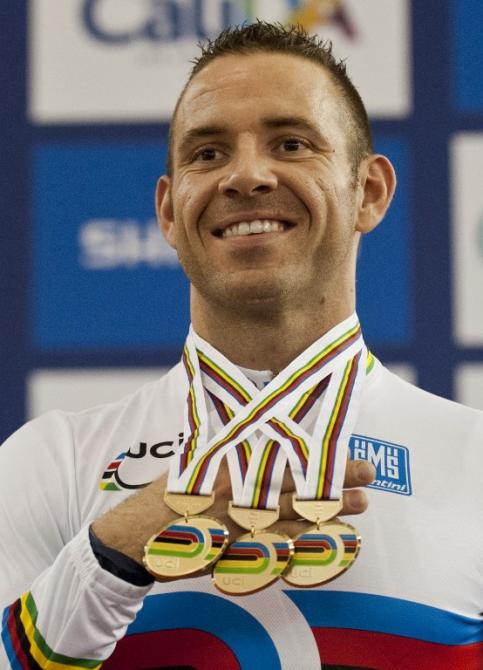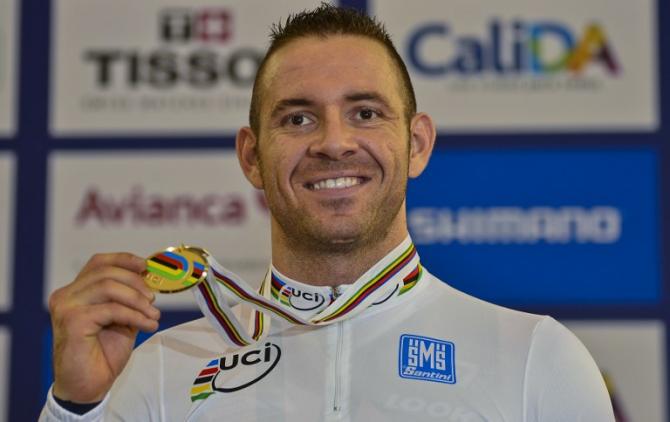Japanese keirin experience helps Pervis conquer the world
Triple gold medallist on the difficulties of competing against Britain


François Pervis has travelled a long way since he was passed over for selection for the London 2012 Olympic Games. Then approaching his 28th birthday, it appeared as though the Frenchman’s career might simply peter out, but less than two years later, he is belatedly at the very summit of his art.
After breaking Arnaud Tournant’s longstanding kilometre world record in Aguascalientes in December, Pervis carried his form through to the world championships in Cali last week, where he made history by winning three individual gold medals in the kilometre, sprint and keirin.
Pervis’ first rainbow jersey in the kilometre in Minsk last year was widely seen as a turning point in his career, but in reality, the déclic had already taken place a few months earlier, when he immersed himself in Japan’s fiercely-contested keirin circuit. He had already sampled Japanese keirin racing some years earlier, but his stint in the Far East in the autumn of 2012 was as much about soul-searching as it was about gaining experience.
“After the London Olympics, I was really very disappointed that I hadn’t been picked and it was a hard thing to live with,” Pervis told Cyclingnews on Friday. “I took myself off to Japan and I cut off my communication with France and I questioned everything. I asked myself why I was always second, third or fourth at the Worlds and why I hadn’t been selected for the Olympics.”
There is a very big difference between the keirin as seen in the Olympics and as practised in its country of origin, where its popularity is tied closely to the betting industry that built up around it. Riding on concrete tracks and uniform steel frames, Japanese keirin seems a lifetime away from the marginal gains of an Olympic velodrome. In was perhaps precisely what Pervis needed.
“Japan did me a lot of good, I had to train all by myself,” Pervis said. “The sprints are very hard over there. They’re much longer and that’s tough mentally. The tracks are made of concrete and outdoors, and you race even if it’s raining. On top of that, the bikes aren’t rigid, you’re racing on steel frames, so physically it’s very hard. I gained a lot of power from racing in Japan.
Indeed, so taken was Pervis with the experience that he returned again for five months last year and this April the Château Gontier native will head out for his fourth lengthy tour of duty on the concrete tracks of Japan. “The Japanese don’t hand out any gifts either," he said with more than a hint of relish. "Every sprint is a war over there, but then that helps you progress too…”
The latest race content, interviews, features, reviews and expert buying guides, direct to your inbox!
Pervis was in little mood to hand out gifts himself in Cali last week, where he won every round en route to his historic three-medal haul at the Worlds. “The kilometre and 200 metres records were very important but this was the first time that a rider has won the three individual events at the track Worlds,” he said. “Those three medals have certainly had a bigger impact in the media at home, though.”
Taking on the British
While Pervis’ suitcase full of rainbow jerseys dominated headlines in France, across the English Channel there was much handwringing over the British men’s team’s failure to land a single medal at the Cali Worlds, less than two years on from their dominant showing at the London Olympics.
Pervis, however, is adamant that the Jason Kenny and the British squad will remain the men to beat come the Rio Games in 2016. “Oh, I’m not worried for the English,” he laughed. “In Rio in two years’ time, they’re going to win everything. Cali was an intermediary step for them, but they’ll be there at the Olympic Games. There’s no problem.”
The discrepancies between British levels of performance at the Worlds and Olympics have been highlighted by some within the French camp over the years, with their wheels drawing particular suspicion at the London Games. Pervis, however, is diplomatic when asked for his opinion of Britain’s Olympic record.
“I think they have some very high-tech material that they only use for the Olympic Games to make the difference,” he said. “But as well as that, it’s about their level of physical and mental preparation vis à vis things like diet. We don’t do anything like that in France, except by ourselves.”
On the eve of the track world championships, the French Cycling Federation inaugurated its new Vélodrome National in Saint-Quentin-en-Yvelines, the first permanent, regulation-sized indoor track in the greater Paris area since the closing of the famous Vélodrome d’Hiver some 55 years ago.
Pervis accepts that the new track is an important base for the French sprinters, just as Manchester has been for their British counterparts, but he noted that the next challenge facing the FFC is to attract the same kind of funding and development similar resources to British Cycling.
“We only had a 166-metre track at our previous training centre, the INSEP and that meant we had to use smaller gears than we use in competition. It was far from ideal,” Pervis said. Now we’ve got a 250-metre track and that means we can train much better than before, but France doesn’t have the same money that Britain does to develop material.
“The English develop all of their equipment – bikes, helmets, everything – themselves. Nothing is left to chance with the English, whereas we don’t have a choice because we don’t have the same means with which to develop material.”
Indeed, Pervis’ Twitter profile notes that he is “searching for sponsors” and while his recent spate of success has attracted some interest, like most on the track, he is still competing at a professional level on what is an essentially amateur budget. He is hopeful that the French federation’s proposed multi-disciplinary team could improve his situation, but for now, he is still forced to go cap in hand in search of backing.
“It’s a bit easier now after the records and the Worlds but it’s still pretty hard. I don’t earn a lot of money. It’s my wife who pays for our needs. She pays for our apartment, the insurance and I have no social insurance myself, so I don’t have anything put away for the future when I retire. I’m always having to approach new companies to ask if they will be my sponsor.”
Regardless of how it’s funded, the goal remains Rio, where Pervis hopes to make his first Olympic appearance since competing in the kilometre in Athens in 2004. With that event no longer on the Olympic programme, however, his focus will shift to the team sprint, the keirin and – perhaps – the individual sprint between now and 2016.
“If I’m the best sprinter in France before the Rio Games, then I’ll do the individual sprint but it’s hard because there’s only one place and it’s two years away, so a lot could happen,” he said. “But in any case, the kilometre won’t be a priority for the coming years, I’ll be focused more on the Olympic events.”
François Pervis will compete in Round 5 of the Revolution Cycling Seriees in Lee Valley VeloPark in London. The event will be streamed live on YouTube on Saturday 15th March, at https://www.youtube.com/user/FACECycling
The official Revolution Series website is http://www.cyclingrevolution.com/

Barry Ryan was Head of Features at Cyclingnews. He has covered professional cycling since 2010, reporting from the Tour de France, Giro d’Italia and events from Argentina to Japan. His writing has appeared in The Independent, Procycling and Cycling Plus. He is the author of The Ascent: Sean Kelly, Stephen Roche and the Rise of Irish Cycling’s Golden Generation, published by Gill Books.